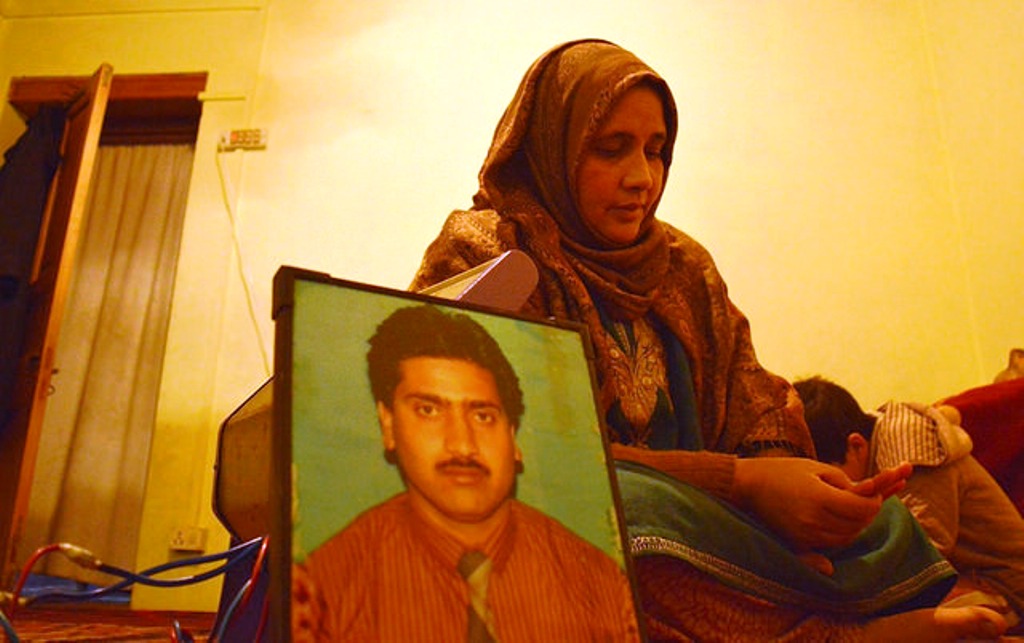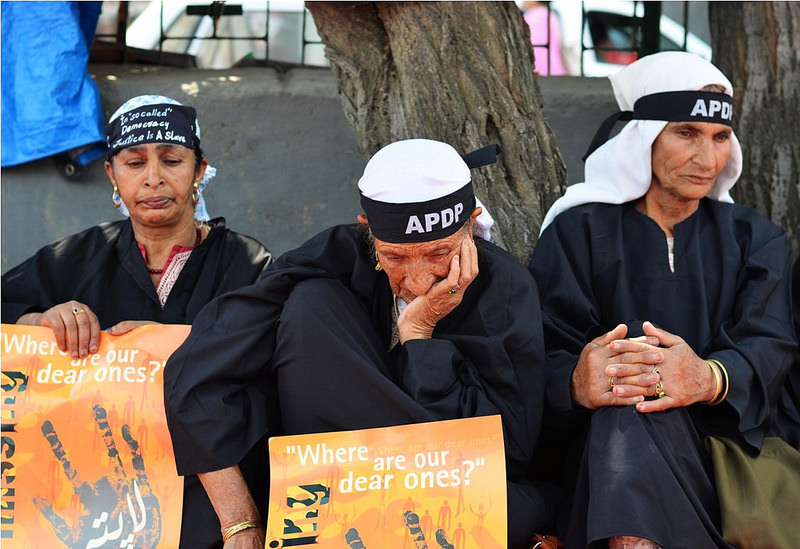On August 30, Kashmir remembers those who disappeared forever at the hands of security forces

By Raqib Hameed Naik, TwoCircles.net
Srinagar: Safiya Azad was 17 when she got married to Himayoun Azad, then 22, in the Kursoo Rajbagh area in Srinagar. On April 20, 1993, he went to visit his sister, who was married and lived in Lasjan, another area of Srinagar.
As Azad reached a picket on the Mehjoor Nagar Bridge–a five-minute drive from their residence–the soldiers of the 137th Battalion of the Border Security Force (BSF) stopped them and asked them for identities.
[caption id="attachment_415929" align="aligncenter" width="1024"] (Safiya Azad)[/caption]
(Safiya Azad)[/caption]
On examining the identity card of Himayoun, the guards dragged him out of the car, claiming they had prior information about his travel. The BSF soldiers bundled him into their vehicle and took him straight to their camp which was then located near New Convent school, Rajbagh. Days turned into weeks, there was no word about him from anywhere.
The family went to almost every security force camps and police lockups across the state, but every time to return back home empty handed. “Till 2000 we used to get clues from people. He is here; he is there. On visiting those places, we wouldn’t find him,” says Safiya. The family’s wait continues.
Shabnum Wani, 51, has a similar story to tell. On July 6, 1997, her husband, Abdul Rashid Wani, then a 30-year-old truck driver had to visit a trader in Parimpora, Srinagar to deliver an amount of Rs 21,000 for the wood he had supplied to a dealer outside Kashmir.
The moment he reached near JVC Mandi, the army vehicles overtook his scooter and stopped in front of him. At once they pounced upon Rashid, and took him inside the vehicle and drove away leaving behind his friend and scooter on the road.
There was no word or information available to the family as to which army battalion had picked him up. After two days, Shabnum went to search out for the public vehicle which the Army men had hired on that day fateful day. Fortunately, she found one driver who acknowledged a bearded man picked up by the Army in his vehicle from JVC Mandi.
The driver told Shabnum that the Army men were from 2/8 GR, Gorkha Rifles camped at Rawalpora Srinagar and their commander, Captain Yadav, had hired his vehicle that day. “The driver told me that Captain Yadav had said that we have to pick any bearded man who comes in front of us,” recalls Shabnum.
[caption id="attachment_415930" align="aligncenter" width="800"] (Credits Azaan Shah)[/caption]
(Credits Azaan Shah)[/caption]
He further told that her husband was first taken to an army camp in Sanat Nagar where Capitan Yadav got down from the vehicle to discuss something with officers inside the camp and later took him to Rawalpora camp. That was the last time anybody had seen or heard anything about Rashid.
Apart from these two cases, according to conservative estimates, there are around 8,000-10,000 cases of involuntary and enforced disappearances in Kashmir mainly attributed to being the work of Indian security establishments since the onset of militancy.
After Kashmir erupted against the rigged elections of 1987, many Kashmiris picked up guns to fight against the Indian establishment. The Indian government too decided to deal with an iron fist against the uprising to put a curb on Kashmiris joining militancy. As the crackdown on militants started in the early 90s, jails and torture centres of different Indian security agencies in Kashmir became occupied with alleged militants and thousands of sympathisers picked up on mere suspicion of whom thousands are missing since then.
Mothers lost their sons, wives lost their husbands, sisters lost their brothers, and continue to remain in a dilemma over whether their loved ones are dead or alive.
“No one can understand the pain we are going through. Sometimes, we feel that our loved ones are alive and sometimes, we fear the worst. This feeling kills us everytime we think about our dear ones who have been disappeared by the security forces,” said Parveena Ahangar, chairperson of Associations of Parents of Disappeared Persons (APDP) and a mother whose 16-year-son was picked up by security forces in 1990 and has been missing since then.
“When a person dies, you have a grave where you can visit if you miss them but for us, we only have their memories which will stay and haunt us forever,” she added.
In 1994, it was this question which led Parveena Ahangar, often termed as ‘Iron Lady of Kashmir’, to set up APDP. It was her attempt to bring together families of disappeared persons from different parts of Jammu and Kashmir. The pain had to be shared if one had to fight it.
On the 10th of every month, the family of missing persons, headed by Parveena, seek answers and justice from both the state and central governments on the whereabouts of their loved ones. Not that much happens as a result of this since the state government does not even acknowledge that such a huge number of people have gone missing in the state.
“We won't let the new Kashmir generation go through what we have endured and our fight for justice will continue. We will keep asking questions to the state and central government about the disappearance of our loved ones,” Ahangar says.
Kashmir-based human rights activist and Chairperson of Asian Federation Against Involuntary Disappearances Khurram Parvez castigated the role of successive governments at state and centre in addressing the issue of enforced disappearances by the central government.
He said, “There has not been a single case in which the Judiciary was able to convict security force personnel. There has been no investigations, prosecutions or accountability in the cases of enforced disappearances despite the ample evidence and witness testimonies.”
He further said that his organisation had asked the government of India to allow international bodies to investigate the cases of enforced disappearances by the security forces but to no avail.
“We even told them, if they don’t allow international bodies to investigate it at least establish an internal commission of inquiry but they didn’t. Justice has never been their priority,” he added.
On Wednesday, August 30th, the world will observe the International Day of Victims of Enforced Disappearances, including Kashmir Valley.
“We are presently on a sit-in protest for the whole day in Pratap park,” Ahangar told TwoCircles.net. “We ask the very same question, as we have been asking for last 27 years. Where are our loved ones?” she added.
Related:
A Special Series on cases of Enforced Disappearances in Kashmir
